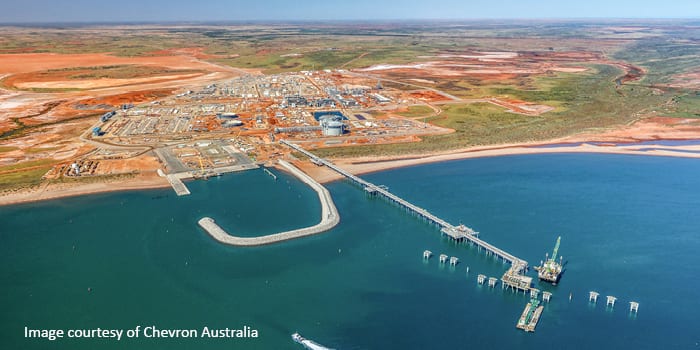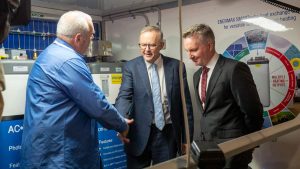Green groups have reacted angrily to the news that the federal government’s $5 billion Northern Australia Infrastructure Facility, or NAIF, has agreed to issue its first loan to a WA shipping base that will service the oil and gas industry.
The fund’s board this week approved a $16.8 million, 10-year concessional loan for expanding the port facility in Onslow, in WA’s Pilbara region.
According to reports, the project still needs to get the tick of approval from Deputy Prime Minister Barnaby Joyce – who is the Turnbull government minister overseeing the fund, after Resources minister Matt Canavan stepped aside pending an investigation into his dual Italian citizenship.
The AAP said on Tuesday that Joyce – who is facing his own citizenship trials, but opted not to resign – has until the end of October 20 to approve the loan, which also needs the WA government’s approval. But comments made by the deputy PM suggest he supports backing the project.
“By widening and deepening the channel and expanding the wharf, the proposed project will create a multi-user facility which is anticipated to help deliver more than $100 million in economic benefit to the region and over 220 jobs,” he said on Tuesday.
But green groups have slammed the NAIF board’s decision, arguing it should be focusing on backing low-carbon and sustainable infrastructure projects with a long-term future.
They also argue that the decision reinforces concerns that NAIF’s “weak and loose” investment mandate will allow it to be raided for further fossil fuel project subsidisation – including a $1 billion loan to Adani’s controversial Carmichael coal mine in northern Queensland.
“This announcement confirms our worst fears that the NAIF is a slush fund for the dirty fossil fuel industry,” said the Australian Conservation Foundation campaigner, Basha Stasak.
“NAIF shouldn’t be making any investment decisions while it is the subject of a Senate inquiry and potential assessment by the Auditor-General,” Stasak added.
“There are critical flaws in NAIF’s transparency, design and operation. It is a broken organisation that lacks fundamental checks and balances and requires major reform.”
Environment Justice Australia was also quick to question the loan – in particular, whether it met with commercial finance best practice requirements, or with the federal government’s Paris climate commitments.
“NAIF’s first loan is effectively a new subsidy to support the fossil fuel industry in Australia,” said EJA lawyer David Barnden in comments on Tuesday.
“Commercial banks would most likely have found the Onslow project, which services fossil fuel extraction projects, too risky to support, but NAIF’s investment mandate is very weak and loose.
“The fund’s ‘public benefit’ test is limited to two virtually meaningless considerations that could be satisfied by almost any proposal,” Barnden said.
“Taxpayers who stump up NAIF’s $5 billion should be told whether (it) considered climate change risk, commercial finance best practice and Australia’s Paris commitments when making a decision to lend to this project.”
As Barnden and Stasak both noted, NAIF is considering whether to subsidise Adani’s Galilee Basin coal project with a $1 billion handout, despite – or perhaps because of – the fact that no major Australian or international banks will touch the controversial project.
Speaking on ABC TV’s Q&A program on Monday night, Canavan was evasive about whether or not he would continue to support a NAIF loan to the massive Adani Carmichael coal mine, rail and port project, should he return to his position of resources minister and NAIF overseer.
“We need to have projects like this,” Canavan told the Q&A audience. “I don’t see a fundamental issue… with governments investing in infrastructure,” he said, adding that a decision on “that specific investment” would depend on the NAIF board.
But according to Barnden, if NAIF’s board was to “act reasonably,” it could not justify subsidising Adani’s “coal-carting railway line.”
“With all that is known about Adani’s activities and how much the coal from Adani’s Carmichael project would add to the world’s global warming problem, it is inconceivable that a loan for a coal railway would satisfy NAIF’s requirement not to damage government reputations.
“NAIF should invest in proposals that secure a long-term future for northern Australia, like renewable energy projects and infrastructure that benefits communities in the north, not unbankable projects that will contribute to killing the Great Barrier Reef and tens of thousands of tourism jobs,” Barnden said.
“These fossil fuel projects will hasten global warming, contribute to further coral bleaching and threaten our Great Barrier Reef and northern Australian communities,” said the ACF’s Stasak.
“Australians should have no confidence in an organisation that has pledged its allegiance to the polluting fossil fuel industry instead of the Great Barrier Reef and the communities that depend on its survival.”









